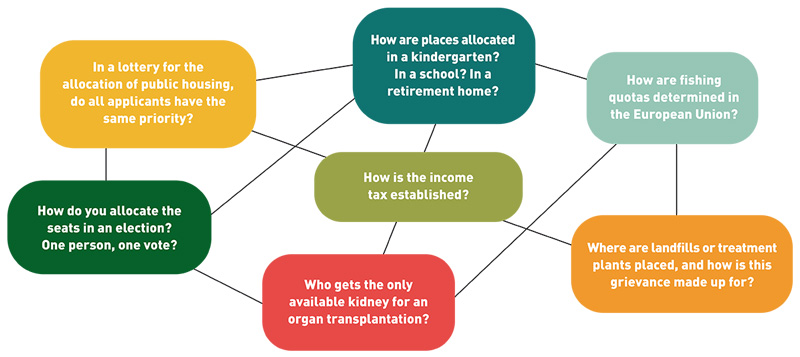Pensar matemàticament
How does society share benefits and duties?
Sharing benefits and duties is subject to rules, according to what’s admissible in terms of what society perceives as such. Resources are not endless, and we compete for them. What we face is a problem of fair division. Mathematics allows us to define and justify the rules applied for this division in different instances. For each problem, we have different methods and solutions
In these cases, an institution decides the method of distribution. What happens if we leave the distribution in the hands of individuals? Regarding fishing in the oceans, are these individual decisions reconcilable with an efficient division and a preservation of the fishing resource?
In this exhibition we showcase some examples of diferent types of goods to be divided. Some of them, such as Money or water, are homogeneous and divisible, while others, such as the school places, are heterogeneous and indivisible.

Allow us to accompany you on the journey of discovering how mathematics can help solve these issues:
-
Block 1: Conflicting claims
When resources are limited, consuming them means competing for them. The rules for dividing these resources depend on objective rights and on fairness principles. The most common of these rules are the proportional rule and the egalitarian rule.
Conflicting claims problems require certain criteria. -
Block 2: One person, one vote. What’s the interpretation?
«One person, one vote» entails that suffrage must be universal (everybody can vote), but also that all votes should have the same “value”. So, the proportionality principle plays a central role. Proportionality and indivisibility might be difficult to combine.
-
Block 3: What about power?
Power is the capacity to influence through the vote, and it determines how society works.
Is the amount of seats a good way of measuring power? -
Block 4: : Everybody wants the same. How can we allocate in a fair way, without causing envy?
A very common situation: an institution must allocate school or university places, depending on the preferences of the new students.
-
Block 5: What decisions do we take?
Sometimes, the outcome depends, not only on our own decisions, but also on someone else’s. Hence, it is necessary to bear in mind the actions of others!
This exhibition has been made by: F. Javier Martínez de Albéniz Salas (curator), Mikel Álvarez Mozos, Pere Calleja Cortés, Josep M. Izquierdo Aznar, Marina Núñez Oliva, Carles Rafels Pallarola.
Menu
Languages
Contact
- Unitat de Cultura Científica i Innovació (UCC+i)
- Edifici Històric
- Gran Via, 585
- 08007 Barcelona
- Telèfon: 934 035 412
- ucc@ub.edu





